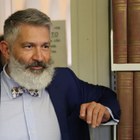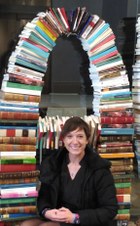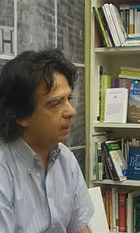
Francesco Benozzo teaches Romance Philology at the Department of Modern Languages, Literatures and Cultures at the University of Bologna. Along with his academic career he is also poet, a musician, and the author of more than 700 publications. His areas of interests include among many the origins of human language, oral poetry, shamanism, anarchism, ethnophilology, critical editions of medieval texts, and the problem of landscape in literature. As a songwriter and harpist, he released 11 CDs, produced in Italy, Denmark and the UK. For his poetry in defense of natural places and for his use of techniques belonging to the ancient tradition of oral poetry, since 2015 he has been nominated for the Literary Nobel Prize.

Luigi Contadini teaches Spanish Literature at the University of Bologna. His areas of research include the phenomenological aspect of literary representations of contemporary writers, the literature of trauma and memory concerning the Spanish Civil War and the Francoist repression and various themes of the Eighteenth Century Spanish (memorial, epic, celebratory poetry, travel literature). He is promoter and organizer of the series of congress on Plural Spain (meetings and conflicts of languages and cultures) organized by the Department of Modern Languages, Literatures and Cultures.

Elena Lamberti teaches North American Literature and Media Studies at the Department of Modern Languages, Literatures and Cultures at the University of Bologna. Her areas of research include: Anglo-American Modernism, Literature and Technology, Cultural Memory, War Literature.
She has published books and essays on English and Anglo-American Modernism, as well as Anglo-American culture of the late 20th Century. Her volume Marshall McLuhan’s Mosaic. Probing the Literary Origins of Media Studies was a finalist for the 2013 Canada Prizes and received the 2016 Award for Outstanding Book in the Field of Media Ecology.
She coordinated the EU/Canada Cultural Project: “PERFORMIGRATIONS: People Are the Territory” (www.performigrations.eu) investigating shifting ideas on/of ‘mobility’ (both cultural and technological).

Monica Notari is an accredited Psychosynthetic Counsellor and a member of the ICT staff at the Department of Modern Languages, Literatures and Cultures, University of Bologna. She has collaborated with a variety of public bodies, developing integrated platforms for e-learning, data-processing and inter-art projects. She has served on the board of the European/Canadian Project “Performigrations: People Are the Territory”, focusing on change, diversity and mobility; as well as on the team of “ACUME – Approaching Cultural Memory, a European Thematic Network” addressing European shared and divided memories.
Her areas of interests include psychosynthesis counselling, cultural memory, media ecology, mobile technologies.

Post-Doc Researcher and Translator
Valeria Reggi is a certified English-Italian translator. She holds a PhD from the Centre for Translation (CenTraS) of University College London, a specialization in literary translation from the University of Venice and a degree with honours in Modern Languages from the University of Bologna, where she has been appointed Independent Subject Expert in English Literature. Valeria Reggi began her career in languages as a research student at the University of Bologna, delivering lectures and publishing articles and translations. She has also gained experience in Marketing Communications for the private sector. Her current research interests focus on multimodal Critical Discourse Analysis applied to political discourse and disinformation

Francesco Vitucci is Junior Assistant Professor of Japanese Philology and Japanese Language and Linguistics at the School of Languages and Literature, Translation and Interpretaton of Alma Mater Studiorum Bologna University. He has also taught Japanese at the Department of Asian and African Studies of Ca’ Foscari University in Venice and at the Faculty of Foreign Languages and Literatures of Catania University. His research is based on multimedia teaching (audiovisual media and Internet in the Japanese class), audiovisual translation and language policies in contemporary Japan.

Jurgita Astrauskienė - a lecturer of Intercultural Translation Aspects and Dubbing at Vilnius University, Kaunas Faculty,
Institute of Languages, Literature and Translation Studies. Her main research interests lie in the area of literary and
audiovisual translation, culture translation, gender and translation, and AVT as a tool for social accessibility.

Justina Urbonaitė is an Assistant Professor at Vilnius University, Faculty of Philology, Institute of English, Romance, and Classical Studies. Her main research interests include cognitive linguistics and contemporary metaphor research. Currently, she is particularly interested in metaphorical representation of certain (minority) groups in public discourse and in ideological implications of such representation.

Paolo Rondelli, born in San Marino, served his Country during the years as civil servant and diplomat, until he covered the posts of General Director of Cultural Institutions, Ambassador to the USA, Ambassador and Permanent Delegate to UNESCO. Artistic Director for the National Theater for four seasons, art curator, National Commissioner at 56th and 57th Venice Art Biennale, he wrote some plays mainly focused on local and social history, gender issues, gender-based discrimination, and some papers for magazines of the University of Bologna (i.e. Storia e Futuro). He is a member of the Scientific Board of the University of San Marino Center for Historical Studies. For ages his interests are Cinema, Art, Theater and performing Arts, which he considers essential ingredients for an healthy living.

Ana R. Calero Valera, Senior Lecturer of German Studies at the University of Valencia (Spain), received her PhD. from the same university with a dissertation about Heiner Müller’s rewriting of Shakespeare’s plays. Her current research centers on German Documentary Theatre and Freies Theater, and on topics such as migration, globalization, and the representation of perpetrators in literary texts.
At present, she is Vice-Dean of Internationalization and Participation of the Faculty of Philology, Translation and Communication of the University of Valencia (Spain), and coordinator of the project “INNOVA-TEA” on innovation in educational methodologies through drama techniques (Lecture-Performance and Radio-Podcast).

Ana Giménez Calpe graduated in Germanic Studies and in Audiovisual Communication from the University of Valencia (Spain). She received her Ph.D from the same university in February 2014 with a dissertation about Gender (de)construction in a selection of Elfriede Jelinek’s plays. Between 2005 and 2009 she worked in the field of the mass media. She joined the German Department at the University of Valencia in 2016, after having taught at the University of Texas of the Permian Basin (Texas, United States) and at the University of Granada. Her teaching and research interests include German literature of the 20th century, drama, memory studies and feminist theory.

Leonardo Barceló Lizana graduated at USACH (University of Santiago, Chile) in Spanish Literature in 1971 and in Foreign Modern Languages and Literatures at the University of Bologna in 1977. He has been a political refugee in Italy since 1974, the year of the coup against the Chilean government of Salvador Allende.
He was a Spanish language teacher at the Inter-Faculty Center of Applied Linguistics of the University of Bologna from 1980 to 2012.
He worked as a lecturer at the seminar on Interculturality at the Faculty of European Languages of the University of Modena from 2002 to 2004.
He served as City Councillor for the municipality of Bologna from 2004 to 2006.

Marco Petrelli teaches North American Literature at the University of Bologna. He holds a PhD in English-language Literatures from "Sapienza", University of Rome. His research interests include the literature and culture of the US South, the American Gothic, Postmodernism, Geocriticism and Graphic Narratives. He taught in various Italian Universities, and his essays (on authors such as Cormac McCarthy, William Faulkner, Stephen King, and Saa Taylor) appeared in a number of Italian and international journals. His first book is Paradiso in nero: spazio e mito nella narrativa di Cormac McCarthy. He collaborates with the newspaper Il manifesto as a literary critic.

Assistant Professor
PAOLO GRANATA is an Assistant Professor in Book and Media Studies at St. Michael’s College in the University of Toronto, President of the Media Ecology Association, and Director of the Media Ethics Lab at the University of Toronto. He is also a member of the Executive Committee at the Canadian Commission for UNESCO as Chair of the Culture, Communication and Information Sectoral commission. His main books are: Arte in Rete (2001), Arte, estetica e nuovi media (2009), Mediabilia (2012), and Ecologia dei media (2015).

PIETRO FLORIDIA, a theatre director, scriptwriter, scenographer and actor, Pietro has founded and managed several theatres in the Bologna area since 1993. He has realised performances and projects about diversity and intercultural exchange; among them, La Compagnia dei Rifugiati (The Company of the Refugees), which was involved in many laboratories, performances and conferences on theatre, and gave birth to meetings, exhibitions and performances.
Pietro’s travels across the world, from Palestine and Nicaragua to Bolivia and Africa, have always provided the grounding experiences for his projects. One of the most meaningful was his journey to Senegal, through Morocco and Mauritania, to meet the migrants leaving North Africa to reach Italy. Out of this experience were born a book and a performance, in which Pietro performed on stage.
La Compagnia dei Rifugiati has now become an independent project and has changed its name to Cantieri Meticci, where Pietro is currently covering the role of artistic and main director.